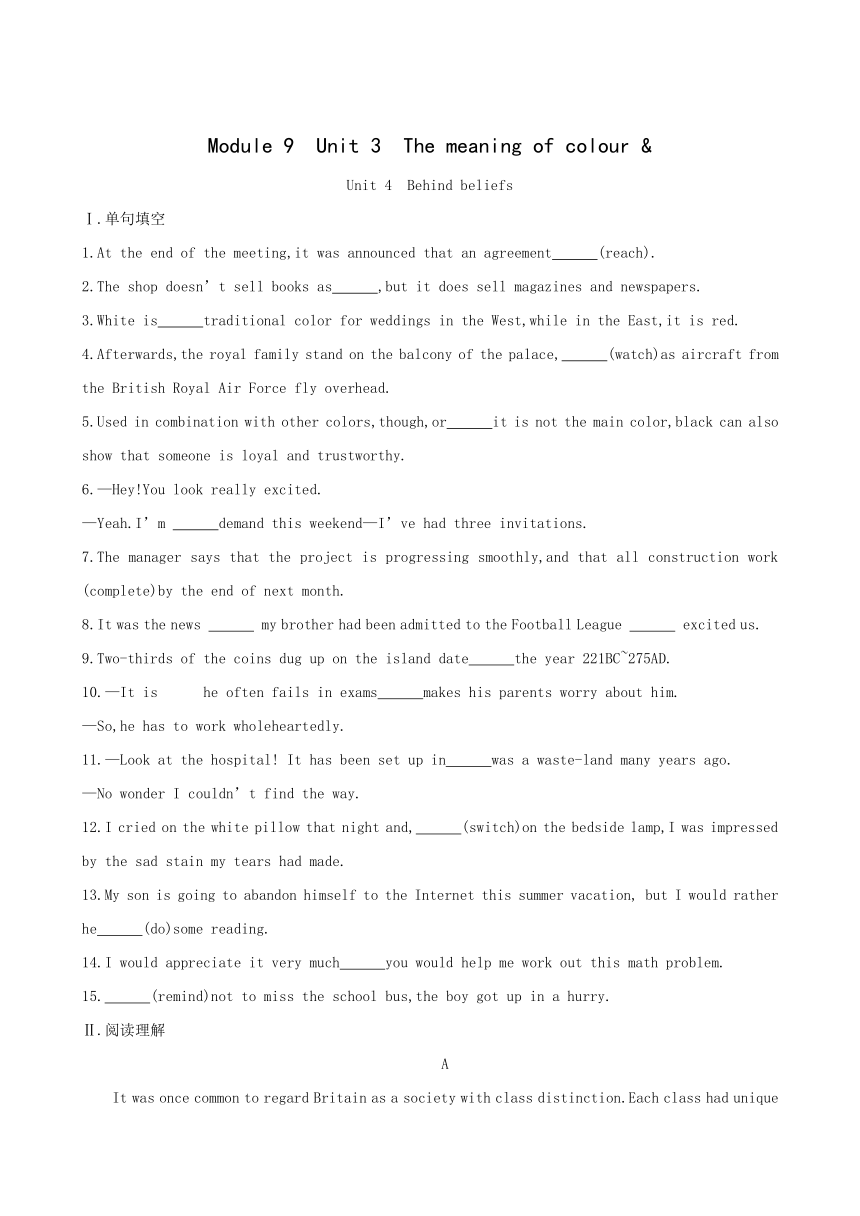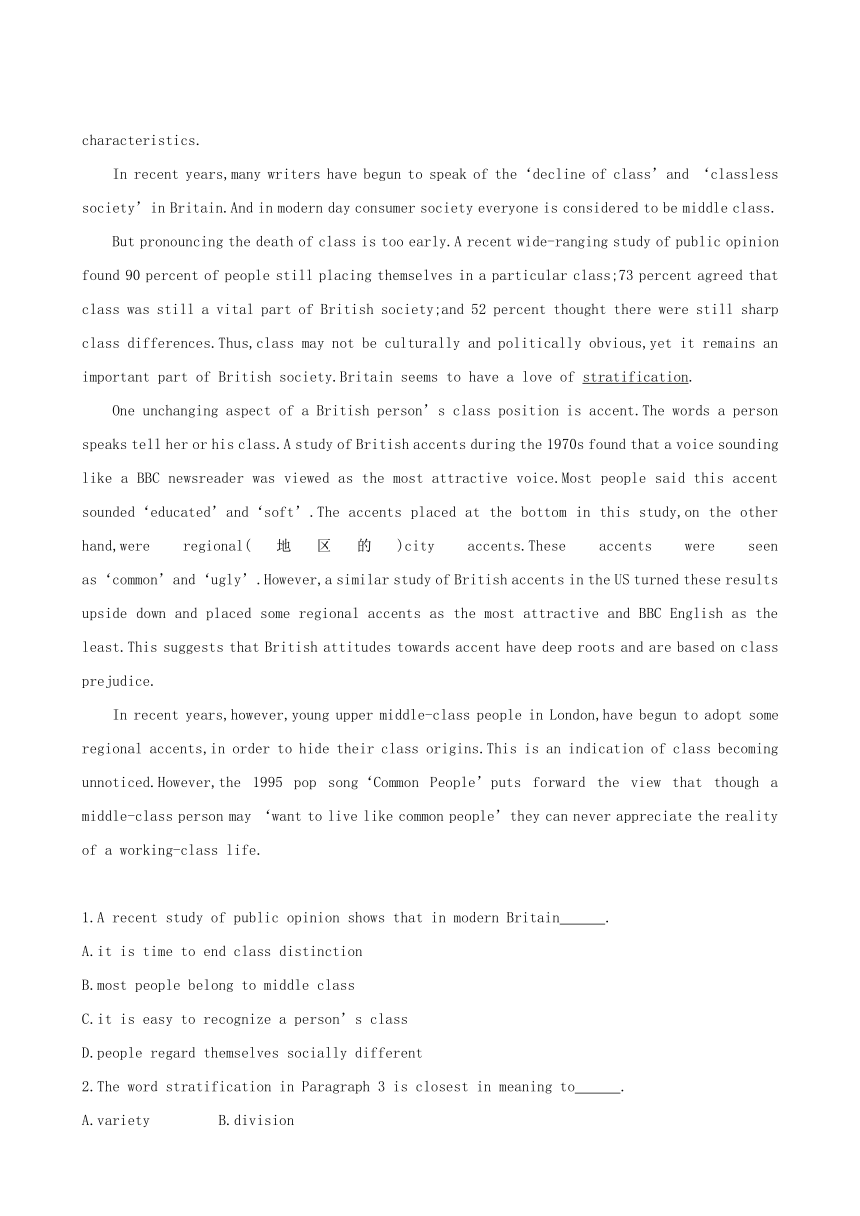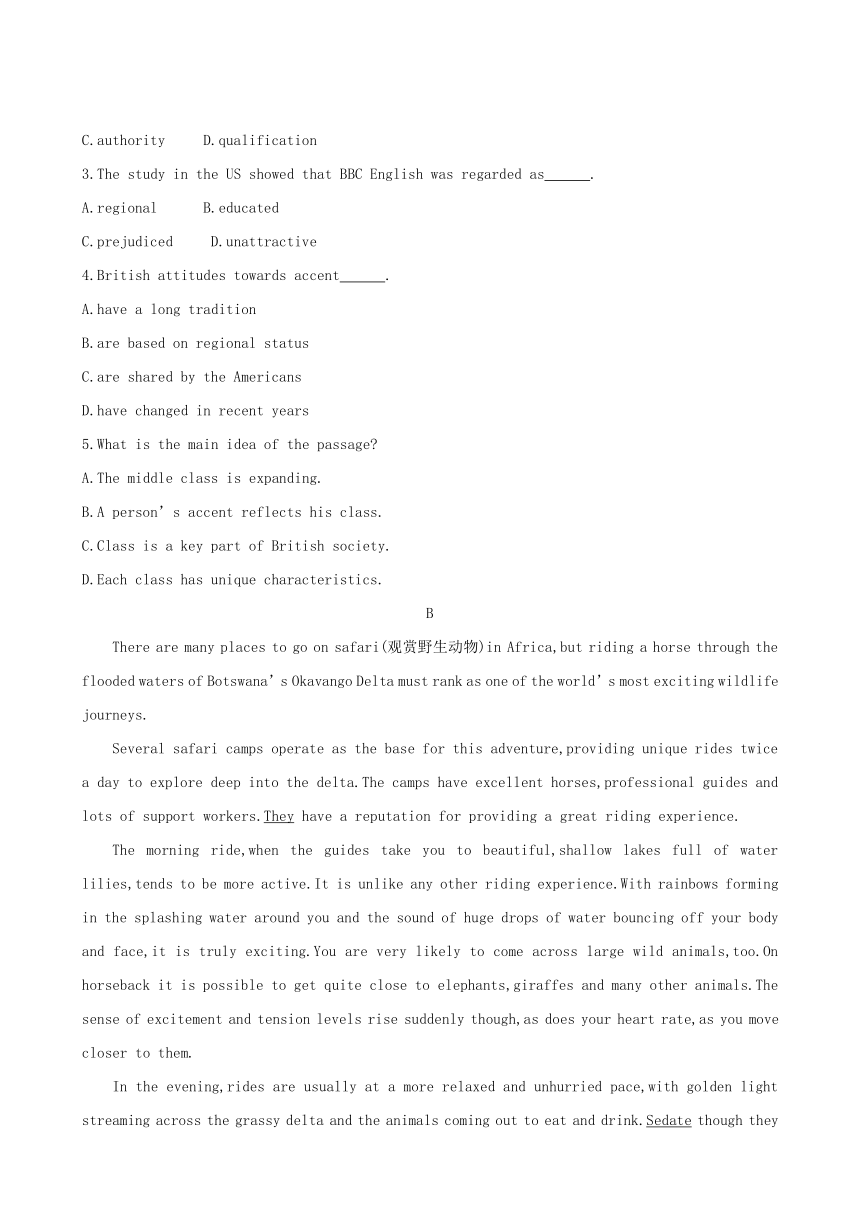2017届牛津译林版英语高考一轮训练题:9 unit3 the meaning of colour & unit4 behind beliefs
文档属性
| 名称 | 2017届牛津译林版英语高考一轮训练题:9 unit3 the meaning of colour & unit4 behind beliefs |

|
|
| 格式 | zip | ||
| 文件大小 | 128.7KB | ||
| 资源类型 | 教案 | ||
| 版本资源 | 牛津译林版 | ||
| 科目 | 英语 | ||
| 更新时间 | 2016-12-28 20:33:20 | ||
图片预览



文档简介
Module
9 Unit
3 The
meaning
of
colour
&
Unit
4 Behind
beliefs
Ⅰ.单句填空
1.At
the
end
of
the
meeting,it
was
announced
that
an
agreement (reach).
2.The
shop
doesn’t
sell
books
as ,but
it
does
sell
magazines
and
newspapers.
3.White
is traditional
color
for
weddings
in
the
West,while
in
the
East,it
is
red.
4.Afterwards,the
royal
family
stand
on
the
balcony
of
the
palace, (watch)as
aircraft
from
the
British
Royal
Air
Force
fly
overhead.
5.Used
in
combination
with
other
colors,though,or it
is
not
the
main
color,black
can
also
show
that
someone
is
loyal
and
trustworthy.
6.—Hey!You
look
really
excited.
—Yeah.I’m
demand
this
weekend—I’ve
had
three
invitations.
7.The
manager
says
that
the
project
is
progressing
smoothly,and
that
all
construction
work
(complete)by
the
end
of
next
month.
8.It
was
the
news
my
brother
had
been
admitted
to
the
Football
League
excited
us.
9.Two-thirds
of
the
coins
dug
up
on
the
island
date the
year
221BC~275AD.
10.—It
is he
often
fails
in
exams makes
his
parents
worry
about
him.
—So,he
has
to
work
wholeheartedly.
11.—Look
at
the
hospital!
It
has
been
set
up
in was
a
waste-land
many
years
ago.
—No
wonder
I
couldn’t
find
the
way.
12.I
cried
on
the
white
pillow
that
night
and, (switch)on
the
bedside
lamp,I
was
impressed
by
the
sad
stain
my
tears
had
made.
13.My
son
is
going
to
abandon
himself
to
the
Internet
this
summer
vacation,
but
I
would
rather
he (do)some
reading.
14.I
would
appreciate
it
very
much you
would
help
me
work
out
this
math
problem.
15. (remind)not
to
miss
the
school
bus,the
boy
got
up
in
a
hurry.
Ⅱ.阅读理解
A
It
was
once
common
to
regard
Britain
as
a
society
with
class
distinction.Each
class
had
unique
characteristics.
In
recent
years,many
writers
have
begun
to
speak
of
the‘decline
of
class’and
‘classless
society’in
Britain.And
in
modern
day
consumer
society
everyone
is
considered
to
be
middle
class.
But
pronouncing
the
death
of
class
is
too
early.A
recent
wide-ranging
study
of
public
opinion
found
90
percent
of
people
still
placing
themselves
in
a
particular
class;73
percent
agreed
that
class
was
still
a
vital
part
of
British
society;and
52
percent
thought
there
were
still
sharp
class
differences.Thus,class
may
not
be
culturally
and
politically
obvious,yet
it
remains
an
important
part
of
British
society.Britain
seems
to
have
a
love
of
stratification.
One
unchanging
aspect
of
a
British
person’s
class
position
is
accent.The
words
a
person
speaks
tell
her
or
his
class.A
study
of
British
accents
during
the
1970s
found
that
a
voice
sounding
like
a
BBC
newsreader
was
viewed
as
the
most
attractive
voice.Most
people
said
this
accent
sounded‘educated’and‘soft’.The
accents
placed
at
the
bottom
in
this
study,on
the
other
hand,were
regional(地区的)city
accents.These
accents
were
seen
as‘common’and‘ugly’.However,a
similar
study
of
British
accents
in
the
US
turned
these
results
upside
down
and
placed
some
regional
accents
as
the
most
attractive
and
BBC
English
as
the
least.This
suggests
that
British
attitudes
towards
accent
have
deep
roots
and
are
based
on
class
prejudice.
In
recent
years,however,young
upper
middle-class
people
in
London,have
begun
to
adopt
some
regional
accents,in
order
to
hide
their
class
origins.This
is
an
indication
of
class
becoming
unnoticed.However,the
1995
pop
song‘Common
People’puts
forward
the
view
that
though
a
middle-class
person
may
‘want
to
live
like
common
people’they
can
never
appreciate
the
reality
of
a
working-class
life.
1.A
recent
study
of
public
opinion
shows
that
in
modern
Britain .
A.it
is
time
to
end
class
distinction
B.most
people
belong
to
middle
class
C.it
is
easy
to
recognize
a
person’s
class
D.people
regard
themselves
socially
different
2.The
word
stratification
in
Paragraph
3
is
closest
in
meaning
to .
A.variety
B.division
C.authority
D.qualification
3.The
study
in
the
US
showed
that
BBC
English
was
regarded
as .
A.regional
B.educated
C.prejudiced
D.unattractive
4.British
attitudes
towards
accent .
A.have
a
long
tradition
B.are
based
on
regional
status
C.are
shared
by
the
Americans
D.have
changed
in
recent
years
5.What
is
the
main
idea
of
the
passage
A.The
middle
class
is
expanding.
B.A
person’s
accent
reflects
his
class.
C.Class
is
a
key
part
of
British
society.
D.Each
class
has
unique
characteristics.
B
There
are
many
places
to
go
on
safari(观赏野生动物)in
Africa,but
riding
a
horse
through
the
flooded
waters
of
Botswana’s
Okavango
Delta
must
rank
as
one
of
the
world’s
most
exciting
wildlife
journeys.
Several
safari
camps
operate
as
the
base
for
this
adventure,providing
unique
rides
twice
a
day
to
explore
deep
into
the
delta.The
camps
have
excellent
horses,professional
guides
and
lots
of
support
workers.They
have
a
reputation
for
providing
a
great
riding
experience.
The
morning
ride,when
the
guides
take
you
to
beautiful,shallow
lakes
full
of
water
lilies,tends
to
be
more
active.It
is
unlike
any
other
riding
experience.With
rainbows
forming
in
the
splashing
water
around
you
and
the
sound
of
huge
drops
of
water
bouncing
off
your
body
and
face,it
is
truly
exciting.You
are
very
likely
to
come
across
large
wild
animals,too.On
horseback
it
is
possible
to
get
quite
close
to
elephants,giraffes
and
many
other
animals.The
sense
of
excitement
and
tension
levels
rise
suddenly
though,as
does
your
heart
rate,as
you
move
closer
to
them.
In
the
evening,rides
are
usually
at
a
more
relaxed
and
unhurried
pace,with
golden
light
streaming
across
the
grassy
delta
and
the
animals
coming
out
to
eat
and
drink.Sedate
though
they
are,rides
at
this
time
of
day
are
still
very
impressive.As
the
sun’s
rays
pass
through
the
dust
kicked
up
by
the
horses,the
romance
of
Africa
comes
to
life.
Back
at
the
camp
you
can
kick
off
your
boots
and
enjoy
excellent
food
and
wine.Looking
back
on
your
day,you
will
find
it
hard
to
deny
that
a
horseback
safari
is
as
close
as
you
will
ever
come
to
answering
the
call
of
the
wild.
1.What
does
the
underlined
word“They”refer
to
A.Flooded
waters.
B.Wildlife
journeys.
C.Safari
camps.
D.Unique
rides.
2.What
does
the
author
find
most
exciting
about
a
horseback
safari
A.Seeing
and
feeling
the
real
African
life.
B.Enjoying
good
food
and
wine
at
the
camp.
C.Hunting
large
animals
just
as
our
ancestors
did.
D.Being
part
of
the
scene
and
getting
close
to
animals.
3.What
does
the
underlined
word“Sedate”probably
mean
A.Wild
and
romantic.
B.Slow
and
peaceful.
C.Hungry
and
thirsty.
D.Active
and
excited.
4.The
author
introduces
the
riding
experience
in
the
Okavango
Delta
mainly
by .
A.following
space
order
B.following
time
order
C.making
classifications
D.giving
examples
Ⅲ.短文改错
假定英语课上老师要求同桌之间交换修改作文,请你修改你同桌写的以下作文。文中共有10处语言错误,每句中最多有两处。每处错误仅涉及一个单词的增加、删除或修改。
增加:在缺词处加一个漏字符号(∧),并在其下面写出该加的词。
删除:把多余的词用斜线(\)划掉。
修改:在错的词下画一横线,并在该词下面写出修改后的词。
注意:1.每处错误及其修改均仅限一词;
2.只允许修改10处,多者(从第11处起)不计分。
Our
government
is
built
a
“harmonious
society”.It
is
our
duty
to
work
hard
to
achieve
this
goals.First
of
all,we
should
love
our
motherland,caring
about
the
development
of
our
hometowns
and
take
an
active
part
our
school’s
activities.Secondly,we
should
respect
the
old
and
love
the
young,included
our
parents
and
teachers.We
should
also
unite
the
student
around
us
and
help
each
other.Above
all,we
must
be
honestly
and
reliable
in
our
daily
life.Last
but
not
least,we
should
try
our
best
to
saving
energy
and
protect
against
our
natural
environment.Let’s
start
right
now
and
spares
no
effort
to
do
a
little
bit
every
day!
答案全解全析
Ⅰ.单句填空
1.had
been
reached 句意:会议结束时,一项协议被宣布已经达成。reach
an
agreement
达成协议。agreement与reach之间为被动关系,此处动作发生在“宣布”之前,故用过去完成时的被动语态。
2.such 句意:严格说来这家商店不卖书,但它的确销售杂志和报刊。as
such意为“从字面意义看;严格说来”。
3.a 句意:在西方白色是婚礼的传统颜色,而在东方,则是红色。
4.watching 句意:后来,皇室成员站在宫殿阳台上,观看英国皇家空军的飞机从头顶上空飞过。此处,watching
as...用作伴随状语。
5.where 句意:然而,与其他颜色合用,或用于非主色调的情况下,黑色同样可以用来表示某个人是忠诚并值得信任的。此处,where引导一个地点状语从句,表示“抽象地点”。
6.in 句意:——嘿!你看起来确实很激动。——是的,这个周末我很受欢迎——已经收到三封请帖。
7.will
have
been
completed 句意:经理说工程进行得很顺利,所有的建筑工作会在下个月底前完成。根据句意可知应用将来完成时的被动语态。
8.that;that 句意:正是我哥哥被足球联合会录取的消息让我们感到很兴奋。第一空that引导同位语从句,说明the
news的内容。
9.from 句意:这个岛上挖出的三分之二的硬币都可以追溯到公元前221年到公元275年。考查介词。date
from始于,追溯到。
10.that;that 句意:——是他经常考试不及格使他的父母为他担心。——那么,他得全力以赴了。设空句为强调句型,被强调部分为主语从句。还原为:That
he
often
fails
in
exams
makes
his
parents
worry
about
him.
11.what 句意:——看那家医院!它是在许多年前是一片荒地的地方建立起来的。——难怪我找不到路了。what引导一个从句作介词in的宾语,what在从句中作主语。
12.switching 句意:那天晚上我扑在白色枕头上哭泣,打开床头灯,泪水留下的难过的污迹使我印象深刻。switching短语为现在分词短语作伴随状语。
13.did 句意:我儿子打算这个暑假沉湎于网络,但我宁愿他看一些书。
14.if 句意:如果你帮我算出这道数学题,我将不胜感激。if引导宾语从句,it在句中作形式宾语。
15.Having
been
reminded 句子的主语the
boy与remind为被动关系,且remind这一动作发生在got
up之前,故填Having
been
reminded。
Ⅱ.阅读理解
A
[语篇解读] 本文为说明文,题材为社会生活类。曾经人们认为英国阶级等级森严,但这一现象到现在是否已经发生变化了呢 本文就英国现在的阶级观念和现状作了介绍和说明。
1.D 细节理解题。根据文章第三段第二句的“A
recent
wide-ranging
study
of
public
opinion
found
90
percent
of
people
still
placing
themselves
in
a
particular
class”可知答案。
2.B 词义猜测题。根据文章第三段最后两句“Thus,class
may
not
be
culturally
and
politically
obvious,yet
it
remains
an
important
part
of
British
society.Britain
seems
to
have
a
love
of
stratification.”可以推测英国人似乎喜欢阶级的这种“分层”。
3.D 细节理解题。根据文章第四段倒数第二句“However,a
similar
study
of
British
accents
in
the
US
turned
these
results
upside
down
and
placed
some
regional
accents
as
the
most
attractive
and
BBC
English
as
the
least.”可知答案。
4.A 推理判断题。根据文章第四段最后一句“This
suggests
that
British
attitudes
towards
accent
have
deep
roots
and
are
based
on
class
prejudice.”可以推断出英国人对口音的态度由来已久。
5.C 主旨大意题。本文主要讲述的是英国阶级制度的现状,阶级等级在英国仍然体现得很明显。故答案为C项。
B
[语篇解读] 本文为说明文,题材为观光旅游类。走进非洲,那里有很多可以观赏野生动物的地方。
1.C 猜测词义题。根据文章第二段中的Several
safari
camps
operate
as
the
base
for
this
adventure...和The
camps
have
excellent
horses...可以推知,“They”在这里指的是safari
camps。故选C项。
2.D 细节理解题。根据文章第三段的描述可知,融入风景、接近动物是作者认为的观赏中最令人激动的事情。
3.B 猜测词义题。根据文章倒数第二段第一句In
the
evening,rides
are
usually
at
a
more
relaxed
and
unhurried
pace...和第二句Sedate
though
they
are...可以推知选B项。
4.B 推理判断题。作者按照时间顺序The
morning
ride;In
the
evening;Back
at
the
camp来进行说明。故选B项。
Ⅲ.短文改错
1.第一句:built→building 本句应该用现在进行时的主动语态。
2.第二句:goals→goal 此处指上句中提到的构建和谐社会这一目标,故用单数形式。
3.第三句:caring→care 此处应与本句中的love、take并列。
4.第三句:part后加in take
an
active
part
in(积极参加某项活动)为固定短语。
5.第四句:included→including including为介词,意为“包括”。
6.第五句:student→students 句意:我们还应该团结我们周围的同学并相互帮助。我们周围的同学是复数概念,故用students来表达。
7.第六句:honestly→honest 系动词be后应该用形容词作表语。
8.第七句:saving→save try
one’s
best
to
do
sth
为固定短语,意为“尽力去做某事”。
9.第七句:去掉against protect是及物动词,后面可直接加宾语。
10.最后一句:spares→spare Let’s后需用动词原形,此处与start并列。
9 Unit
3 The
meaning
of
colour
&
Unit
4 Behind
beliefs
Ⅰ.单句填空
1.At
the
end
of
the
meeting,it
was
announced
that
an
agreement (reach).
2.The
shop
doesn’t
sell
books
as ,but
it
does
sell
magazines
and
newspapers.
3.White
is traditional
color
for
weddings
in
the
West,while
in
the
East,it
is
red.
4.Afterwards,the
royal
family
stand
on
the
balcony
of
the
palace, (watch)as
aircraft
from
the
British
Royal
Air
Force
fly
overhead.
5.Used
in
combination
with
other
colors,though,or it
is
not
the
main
color,black
can
also
show
that
someone
is
loyal
and
trustworthy.
6.—Hey!You
look
really
excited.
—Yeah.I’m
demand
this
weekend—I’ve
had
three
invitations.
7.The
manager
says
that
the
project
is
progressing
smoothly,and
that
all
construction
work
(complete)by
the
end
of
next
month.
8.It
was
the
news
my
brother
had
been
admitted
to
the
Football
League
excited
us.
9.Two-thirds
of
the
coins
dug
up
on
the
island
date the
year
221BC~275AD.
10.—It
is he
often
fails
in
exams makes
his
parents
worry
about
him.
—So,he
has
to
work
wholeheartedly.
11.—Look
at
the
hospital!
It
has
been
set
up
in was
a
waste-land
many
years
ago.
—No
wonder
I
couldn’t
find
the
way.
12.I
cried
on
the
white
pillow
that
night
and, (switch)on
the
bedside
lamp,I
was
impressed
by
the
sad
stain
my
tears
had
made.
13.My
son
is
going
to
abandon
himself
to
the
Internet
this
summer
vacation,
but
I
would
rather
he (do)some
reading.
14.I
would
appreciate
it
very
much you
would
help
me
work
out
this
math
problem.
15. (remind)not
to
miss
the
school
bus,the
boy
got
up
in
a
hurry.
Ⅱ.阅读理解
A
It
was
once
common
to
regard
Britain
as
a
society
with
class
distinction.Each
class
had
unique
characteristics.
In
recent
years,many
writers
have
begun
to
speak
of
the‘decline
of
class’and
‘classless
society’in
Britain.And
in
modern
day
consumer
society
everyone
is
considered
to
be
middle
class.
But
pronouncing
the
death
of
class
is
too
early.A
recent
wide-ranging
study
of
public
opinion
found
90
percent
of
people
still
placing
themselves
in
a
particular
class;73
percent
agreed
that
class
was
still
a
vital
part
of
British
society;and
52
percent
thought
there
were
still
sharp
class
differences.Thus,class
may
not
be
culturally
and
politically
obvious,yet
it
remains
an
important
part
of
British
society.Britain
seems
to
have
a
love
of
stratification.
One
unchanging
aspect
of
a
British
person’s
class
position
is
accent.The
words
a
person
speaks
tell
her
or
his
class.A
study
of
British
accents
during
the
1970s
found
that
a
voice
sounding
like
a
BBC
newsreader
was
viewed
as
the
most
attractive
voice.Most
people
said
this
accent
sounded‘educated’and‘soft’.The
accents
placed
at
the
bottom
in
this
study,on
the
other
hand,were
regional(地区的)city
accents.These
accents
were
seen
as‘common’and‘ugly’.However,a
similar
study
of
British
accents
in
the
US
turned
these
results
upside
down
and
placed
some
regional
accents
as
the
most
attractive
and
BBC
English
as
the
least.This
suggests
that
British
attitudes
towards
accent
have
deep
roots
and
are
based
on
class
prejudice.
In
recent
years,however,young
upper
middle-class
people
in
London,have
begun
to
adopt
some
regional
accents,in
order
to
hide
their
class
origins.This
is
an
indication
of
class
becoming
unnoticed.However,the
1995
pop
song‘Common
People’puts
forward
the
view
that
though
a
middle-class
person
may
‘want
to
live
like
common
people’they
can
never
appreciate
the
reality
of
a
working-class
life.
1.A
recent
study
of
public
opinion
shows
that
in
modern
Britain .
A.it
is
time
to
end
class
distinction
B.most
people
belong
to
middle
class
C.it
is
easy
to
recognize
a
person’s
class
D.people
regard
themselves
socially
different
2.The
word
stratification
in
Paragraph
3
is
closest
in
meaning
to .
A.variety
B.division
C.authority
D.qualification
3.The
study
in
the
US
showed
that
BBC
English
was
regarded
as .
A.regional
B.educated
C.prejudiced
D.unattractive
4.British
attitudes
towards
accent .
A.have
a
long
tradition
B.are
based
on
regional
status
C.are
shared
by
the
Americans
D.have
changed
in
recent
years
5.What
is
the
main
idea
of
the
passage
A.The
middle
class
is
expanding.
B.A
person’s
accent
reflects
his
class.
C.Class
is
a
key
part
of
British
society.
D.Each
class
has
unique
characteristics.
B
There
are
many
places
to
go
on
safari(观赏野生动物)in
Africa,but
riding
a
horse
through
the
flooded
waters
of
Botswana’s
Okavango
Delta
must
rank
as
one
of
the
world’s
most
exciting
wildlife
journeys.
Several
safari
camps
operate
as
the
base
for
this
adventure,providing
unique
rides
twice
a
day
to
explore
deep
into
the
delta.The
camps
have
excellent
horses,professional
guides
and
lots
of
support
workers.They
have
a
reputation
for
providing
a
great
riding
experience.
The
morning
ride,when
the
guides
take
you
to
beautiful,shallow
lakes
full
of
water
lilies,tends
to
be
more
active.It
is
unlike
any
other
riding
experience.With
rainbows
forming
in
the
splashing
water
around
you
and
the
sound
of
huge
drops
of
water
bouncing
off
your
body
and
face,it
is
truly
exciting.You
are
very
likely
to
come
across
large
wild
animals,too.On
horseback
it
is
possible
to
get
quite
close
to
elephants,giraffes
and
many
other
animals.The
sense
of
excitement
and
tension
levels
rise
suddenly
though,as
does
your
heart
rate,as
you
move
closer
to
them.
In
the
evening,rides
are
usually
at
a
more
relaxed
and
unhurried
pace,with
golden
light
streaming
across
the
grassy
delta
and
the
animals
coming
out
to
eat
and
drink.Sedate
though
they
are,rides
at
this
time
of
day
are
still
very
impressive.As
the
sun’s
rays
pass
through
the
dust
kicked
up
by
the
horses,the
romance
of
Africa
comes
to
life.
Back
at
the
camp
you
can
kick
off
your
boots
and
enjoy
excellent
food
and
wine.Looking
back
on
your
day,you
will
find
it
hard
to
deny
that
a
horseback
safari
is
as
close
as
you
will
ever
come
to
answering
the
call
of
the
wild.
1.What
does
the
underlined
word“They”refer
to
A.Flooded
waters.
B.Wildlife
journeys.
C.Safari
camps.
D.Unique
rides.
2.What
does
the
author
find
most
exciting
about
a
horseback
safari
A.Seeing
and
feeling
the
real
African
life.
B.Enjoying
good
food
and
wine
at
the
camp.
C.Hunting
large
animals
just
as
our
ancestors
did.
D.Being
part
of
the
scene
and
getting
close
to
animals.
3.What
does
the
underlined
word“Sedate”probably
mean
A.Wild
and
romantic.
B.Slow
and
peaceful.
C.Hungry
and
thirsty.
D.Active
and
excited.
4.The
author
introduces
the
riding
experience
in
the
Okavango
Delta
mainly
by .
A.following
space
order
B.following
time
order
C.making
classifications
D.giving
examples
Ⅲ.短文改错
假定英语课上老师要求同桌之间交换修改作文,请你修改你同桌写的以下作文。文中共有10处语言错误,每句中最多有两处。每处错误仅涉及一个单词的增加、删除或修改。
增加:在缺词处加一个漏字符号(∧),并在其下面写出该加的词。
删除:把多余的词用斜线(\)划掉。
修改:在错的词下画一横线,并在该词下面写出修改后的词。
注意:1.每处错误及其修改均仅限一词;
2.只允许修改10处,多者(从第11处起)不计分。
Our
government
is
built
a
“harmonious
society”.It
is
our
duty
to
work
hard
to
achieve
this
goals.First
of
all,we
should
love
our
motherland,caring
about
the
development
of
our
hometowns
and
take
an
active
part
our
school’s
activities.Secondly,we
should
respect
the
old
and
love
the
young,included
our
parents
and
teachers.We
should
also
unite
the
student
around
us
and
help
each
other.Above
all,we
must
be
honestly
and
reliable
in
our
daily
life.Last
but
not
least,we
should
try
our
best
to
saving
energy
and
protect
against
our
natural
environment.Let’s
start
right
now
and
spares
no
effort
to
do
a
little
bit
every
day!
答案全解全析
Ⅰ.单句填空
1.had
been
reached 句意:会议结束时,一项协议被宣布已经达成。reach
an
agreement
达成协议。agreement与reach之间为被动关系,此处动作发生在“宣布”之前,故用过去完成时的被动语态。
2.such 句意:严格说来这家商店不卖书,但它的确销售杂志和报刊。as
such意为“从字面意义看;严格说来”。
3.a 句意:在西方白色是婚礼的传统颜色,而在东方,则是红色。
4.watching 句意:后来,皇室成员站在宫殿阳台上,观看英国皇家空军的飞机从头顶上空飞过。此处,watching
as...用作伴随状语。
5.where 句意:然而,与其他颜色合用,或用于非主色调的情况下,黑色同样可以用来表示某个人是忠诚并值得信任的。此处,where引导一个地点状语从句,表示“抽象地点”。
6.in 句意:——嘿!你看起来确实很激动。——是的,这个周末我很受欢迎——已经收到三封请帖。
7.will
have
been
completed 句意:经理说工程进行得很顺利,所有的建筑工作会在下个月底前完成。根据句意可知应用将来完成时的被动语态。
8.that;that 句意:正是我哥哥被足球联合会录取的消息让我们感到很兴奋。第一空that引导同位语从句,说明the
news的内容。
9.from 句意:这个岛上挖出的三分之二的硬币都可以追溯到公元前221年到公元275年。考查介词。date
from始于,追溯到。
10.that;that 句意:——是他经常考试不及格使他的父母为他担心。——那么,他得全力以赴了。设空句为强调句型,被强调部分为主语从句。还原为:That
he
often
fails
in
exams
makes
his
parents
worry
about
him.
11.what 句意:——看那家医院!它是在许多年前是一片荒地的地方建立起来的。——难怪我找不到路了。what引导一个从句作介词in的宾语,what在从句中作主语。
12.switching 句意:那天晚上我扑在白色枕头上哭泣,打开床头灯,泪水留下的难过的污迹使我印象深刻。switching短语为现在分词短语作伴随状语。
13.did 句意:我儿子打算这个暑假沉湎于网络,但我宁愿他看一些书。
14.if 句意:如果你帮我算出这道数学题,我将不胜感激。if引导宾语从句,it在句中作形式宾语。
15.Having
been
reminded 句子的主语the
boy与remind为被动关系,且remind这一动作发生在got
up之前,故填Having
been
reminded。
Ⅱ.阅读理解
A
[语篇解读] 本文为说明文,题材为社会生活类。曾经人们认为英国阶级等级森严,但这一现象到现在是否已经发生变化了呢 本文就英国现在的阶级观念和现状作了介绍和说明。
1.D 细节理解题。根据文章第三段第二句的“A
recent
wide-ranging
study
of
public
opinion
found
90
percent
of
people
still
placing
themselves
in
a
particular
class”可知答案。
2.B 词义猜测题。根据文章第三段最后两句“Thus,class
may
not
be
culturally
and
politically
obvious,yet
it
remains
an
important
part
of
British
society.Britain
seems
to
have
a
love
of
stratification.”可以推测英国人似乎喜欢阶级的这种“分层”。
3.D 细节理解题。根据文章第四段倒数第二句“However,a
similar
study
of
British
accents
in
the
US
turned
these
results
upside
down
and
placed
some
regional
accents
as
the
most
attractive
and
BBC
English
as
the
least.”可知答案。
4.A 推理判断题。根据文章第四段最后一句“This
suggests
that
British
attitudes
towards
accent
have
deep
roots
and
are
based
on
class
prejudice.”可以推断出英国人对口音的态度由来已久。
5.C 主旨大意题。本文主要讲述的是英国阶级制度的现状,阶级等级在英国仍然体现得很明显。故答案为C项。
B
[语篇解读] 本文为说明文,题材为观光旅游类。走进非洲,那里有很多可以观赏野生动物的地方。
1.C 猜测词义题。根据文章第二段中的Several
safari
camps
operate
as
the
base
for
this
adventure...和The
camps
have
excellent
horses...可以推知,“They”在这里指的是safari
camps。故选C项。
2.D 细节理解题。根据文章第三段的描述可知,融入风景、接近动物是作者认为的观赏中最令人激动的事情。
3.B 猜测词义题。根据文章倒数第二段第一句In
the
evening,rides
are
usually
at
a
more
relaxed
and
unhurried
pace...和第二句Sedate
though
they
are...可以推知选B项。
4.B 推理判断题。作者按照时间顺序The
morning
ride;In
the
evening;Back
at
the
camp来进行说明。故选B项。
Ⅲ.短文改错
1.第一句:built→building 本句应该用现在进行时的主动语态。
2.第二句:goals→goal 此处指上句中提到的构建和谐社会这一目标,故用单数形式。
3.第三句:caring→care 此处应与本句中的love、take并列。
4.第三句:part后加in take
an
active
part
in(积极参加某项活动)为固定短语。
5.第四句:included→including including为介词,意为“包括”。
6.第五句:student→students 句意:我们还应该团结我们周围的同学并相互帮助。我们周围的同学是复数概念,故用students来表达。
7.第六句:honestly→honest 系动词be后应该用形容词作表语。
8.第七句:saving→save try
one’s
best
to
do
sth
为固定短语,意为“尽力去做某事”。
9.第七句:去掉against protect是及物动词,后面可直接加宾语。
10.最后一句:spares→spare Let’s后需用动词原形,此处与start并列。
同课章节目录
- 模块9
- Unit 1 Other countries, other cultures
- Unit 2 Witnessing time
- Unit 3 The meaning of colou
- Unit 4 Behind beliefs
- 模块10
- unit 1 building the future
- unit 2 people on the move
- unit 3 protecting ourselves
- unit 4 law and orde
- 模块11
- unit 1 careers and skills
- unit 2 getting a job
- unit 3 the secret of success
- unit 4 the next step
